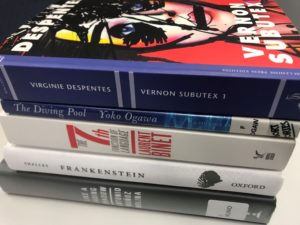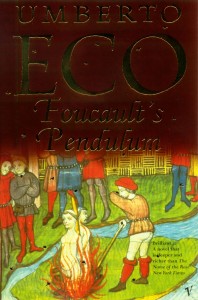My Thoughts and Reading in April 2018
 Earlier in the month my wife was suffering from a major headache, so lying in the dark I decided to pick up my kindle to avoid disturbing her. I had The White Book on my Paperwhite and I knew it would not take me that long to read. Reading in the dark I was transfixed by the light of my Kindle. There is a line in the book that really stayed with me, “Certain objects appear white in the darkness. When darkness is imbued with even the faintest light…” There is something to be said about reading a book at the right time, because the experience alone made this book enjoyable. I love sitting in the dark but normally hate reading on my Kindle, the combination of darkness and talking about white just meshed well.
Earlier in the month my wife was suffering from a major headache, so lying in the dark I decided to pick up my kindle to avoid disturbing her. I had The White Book on my Paperwhite and I knew it would not take me that long to read. Reading in the dark I was transfixed by the light of my Kindle. There is a line in the book that really stayed with me, “Certain objects appear white in the darkness. When darkness is imbued with even the faintest light…” There is something to be said about reading a book at the right time, because the experience alone made this book enjoyable. I love sitting in the dark but normally hate reading on my Kindle, the combination of darkness and talking about white just meshed well.
However that experience pales in comparison to reading The 7th Function of Language. Have you ever read a novel that you think has been tailor made for you? This was my experience with The 7th Function of Language. Everything about this book ticked my boxes, from the mystery element, to the literary criticism. I loved every minute reading this one and I cannot wait to re-reading it in the future. This reminds me of my favourite Umberto Eco book, Foucault’s Pendulum. I had to laugh at the fact so many people were calling this novel ‘too pretentious’ but others were comparing it to Dan Brown.
I often wonder if my literary tastes are the direct opposite to the norm, because I tend to love so many books others are regularly dismissed. Not that I mind at all. It helps with my pretentious literary credibility. Although I think The 7th Function of Language is not pretentious and would make for an exciting audiobook. I have not read hhHh but after reading this one, I am keen to find a copy. Although that novel is more war based, I am still very curious. It did get a lot of hype and attention, which might mean I will be disappointed by the novel.
This month marked the start of my very own podcast, Lost in Translations. My wife and I have been planning this for a very long time and by planning I mean procrastinating. But this we finally released the first episode which is an introduction episode. I was very nervous but beyond thrilled with just how well it turned out. I am surprised how much support I got on a project that has just launched. I am looking forward to releasing the first official episode where we discuss a book I loved last year (no spoilers into what it will be). My wife will be my first guest and while we have not recorded the episode yet, I hope to have it release in the middle of May.
I have loved reading the Man Booker International prize longlist and I am starting to see the light at the end of the tunnel, especially after finishing Like a Fading Shadow and Vernon Subutex 1. It has been a bit of a letdown for me. There are so many books on the list that I thought were so-so but not much I loved, besides The 7th Function of Language, Frankenstein in Baghdad and Die, My Love. I will read the next Vernon Subutex book, and I did have a lot of fun reading it but it was not a standout. I am starting to be distracted by other books and itching to read other things. I am not married to the idea of completing the entire longlist but I thought it was a great opportunity to be part of the community. I am yet to read Go, Went, Gone and Flights, which are on my TBR, so they will get read. I am in the middle of The Imposters and have not brought a copy of The Flying Mountain. So that is four books from the longlist that I would love to complete but the only one I am positive I will read soon is Flights.
The BTBA longlist is looking very tempting.
I re-read Frankenstein again, I received a beautiful edition of the 1818 text and thought it was time to read again. I did use this as an excuse to write a piece on how Frankenstein has impacted my life. Surprisingly I think I learnt a little about myself writing that piece and I am always astounded by what I discover about myself while writing. I think there is something therapeutic about writing and it often unlocks connections I have not thought were there. Writing about Frankenstein helped me understand a little more about my past. That piece will be in the next issue of The Literati which is released very soon.
Finally I picked up The Diving Pool to read, which is the pick for a bookclub I am apart of on Goodreads. I love being a part of a Goodreads group reading books in translation, but not many people are interested in communicating. I love a good forum but I think maybe they have run their course. People join but quickly lose interest. I love the idea of talking about books, especially translations but maybe Goodreads groups are not the right spot. What is the future for the forum format? Is it Discord? Or maybe it is a Facebook group.
I feel like this month has been less productive than other months. Only six books read and hardly any writing getting done. I am happy to see my podcast become a reality so I should not complain. I have The Lost Flowers of Alice Hart on the go, which I need to read for my IRL bookclub but I have not planned what else I will be reading. I like to read on a whim and maybe the Man Booker International prize longlist messed with that and has put me into a little of a slump. Although I hope to break out in May and get back to all the books that keep distracting me throughout the month. We are housesitting so I do not have access to all my books, which might mean a little control but I hope it does not keep my slump going any further.

 Title: Numero Zero (
Title: Numero Zero ( Title: The Prague Cemetery (
Title: The Prague Cemetery ( One of my favourite bookish podcasts is The Readers; if you haven’t heard it before go and subscribe, it offers random book-based banter which has been both enjoyable to listen to and offers some interesting ideas for future blog posts. This post is inspired by the latest episode about the “
One of my favourite bookish podcasts is The Readers; if you haven’t heard it before go and subscribe, it offers random book-based banter which has been both enjoyable to listen to and offers some interesting ideas for future blog posts. This post is inspired by the latest episode about the “ Title: Foucault's Pendulum (
Title: Foucault's Pendulum ( I found this book recently called “Foucault’s Pendulum” (still haven’t read it) but I’m in love with the concept. Reminds me of the John Cage Quote “Finnegans Wake is one of the books I’ve which always loved, but never read” (sorry for the tangent, just adding that quote to remind me to write about both John Cage and Finnegans Wake).
I found this book recently called “Foucault’s Pendulum” (still haven’t read it) but I’m in love with the concept. Reminds me of the John Cage Quote “Finnegans Wake is one of the books I’ve which always loved, but never read” (sorry for the tangent, just adding that quote to remind me to write about both John Cage and Finnegans Wake).